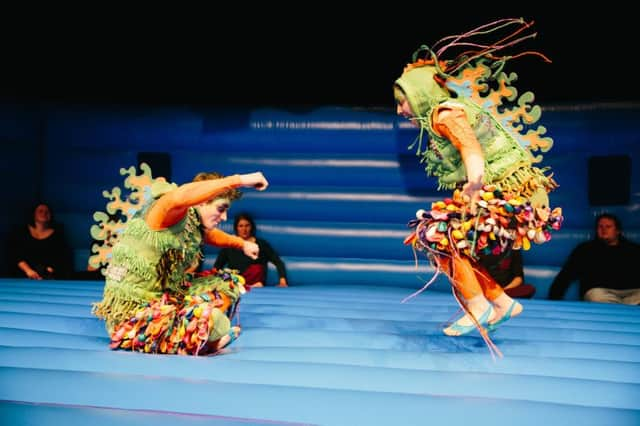Imaginate festival review: Bounce | The Lost Things


Bounce - Southside Community Centre, Edinburgh
* *
The Lost Things - Southside Community Centre, Edinburgh
* * *
Hup - North Edinburgh Arts
* * * *
Mouth Open, Story Jump Out - Church Hill Theatre Studio, Edinburgh
* * * * *
Waves - Traverse Theatre, Edinburgh
* *
It’s hard to imagine a show sounding better on a funding application: take an enormous bouncy castle, allow the audience to climb inside it to watch the show – and then use two parkour/acrobatic specialists to execute some thrilling moves. Yet somewhere between idea and execution, Bounce lost sight of its goal – which was to give young viewers a theatrical experience beyond the excitement of sitting on an inflatable structure.
Advertisement
Hide AdDressed as unidentifiable colourful creatures, the two performers try their hardest to engage the audience, flipping and jumping with controlled energy. Without a narrative structure, or even some sense of emotional purpose, however, they’re fighting a losing battle.
JC Marshall’s text – supposedly spoken by the castle itself, although this is by no means obvious – goes nowhere. At times too verbose for the target age group of five-to-eight years, other times too infantile. “You’ve let us down,” says the castle repeatedly at one point. Yes, thinks the audience, you have.
The other Imaginate commission for 2015 fares considerably better – or rather, it will. Tortoise in a Nutshell’s The Lost Things is on its way to becoming a very fine piece of theatre, if only the company could re-distribute its efforts.
Currently, the lion’s share of their attention has gone on set, props and puppets – all of which look superb. Sitting in a corner feeling lonely and in need of attention, are the storyline and a sense of clarity. From the moment we step inside the small dark tent and sit down on our cushions, we’re full of questions. Where are we? Who is that boy running scared with a bloody knee? Why is that girl building a robot in some sort of subterranean land? As the minutes pass, the questions keep building to the point where the desire for answers verges dangerously on confusion and frustration.
Occasionally poor sightlines also hamper audience understanding, but none of this feels insurmountable. The central ideas – friendship, feeling lost, and the (ultimately futile) desire for children to save their parents – are strong. The show may be dark (in every way) but with some tweaks, its future is bright.
As far removed from the underground action of The Lost Things as possible is Hup – a perfectly tailored work for under-twos. The research and knowhow of pre-school theatre specialists Starcatchers and the talented musicians of the Royal Scottish National Orchestra have combined to give babies and toddlers a delicate introduction to classical music. Two violinists and a cellist are joined by a pesky racoon, determined to enlist everyone into her black and white brigade. Face paint, false bushy tails and stripy socks are produced from various boxes, while the musicians play Abigail Sinar’s gorgeous new score.
Advertisement
Hide AdWhat the babies make of it is anyone’s guess – those synapses are busy firing away in private behind wide, questioning eyes. Some toddle around the carpeted space, most sit absorbing it all like sponges.
Although several years older than the Hup audience, the children watching Mouth Open, Story Jump Out were also gifted with a new way of seeing things. In an ideal world, Birmingham-born storyteller Polarbear (aka Steven Camden) would be cloned and sent into every school and theatre in the land. His ability to engage, amuse and move audiences of all ages, including the hard-to-crack upper primary school crowd, is life-affirmingly brilliant.
Advertisement
Hide AdContinually plucking ideas from the children to shape his story, but with a narrative backbone we can all relate to, the show hurtles along. No answer from the audience fazes him, everything and everyone is respected and valued. The laughs come thick and fast, but so too does a wise lesson in morals and friendship. A triumph from start to finish.
Imaginate associate artist Alice Mary Cooper also takes to the stage alone to impart a story, but there the comparison ends. Her solo show, Waves, tells the fictional tale of a keen swimmer, who unwittingly invents the butterfly stroke after observing penguins and dolphins in the ocean.
Cooper is clear and eloquent in her storytelling, but despite tragedy and triumph featuring in the tale, there is little for the audience to invest in. The story bobs safely along the surface of the water, keeping us interested but never enthralled. With such dynamic subject matter, the absence of raw physicality is puzzling. When peril arrives, we barely register it – likewise the joy of victory. Waves also comes across like a true story, which feels slightly disingenuous for a young audience taking it all at face value
The Imaginate festival runs until tomorrow, www.imaginate.org.uk